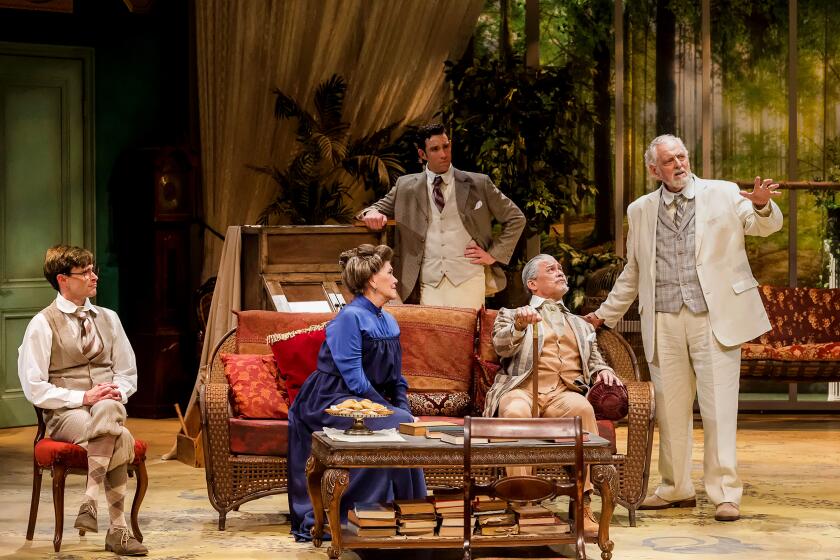Rostropovich Backs an Unfettered NEA : Hearings: Russian-born cellist warns Senate subcommittee of ‘destructive, even catastrophic’ results of censorship
Famed Russian-born cellist and conductor Mstislav Rostropovich, warning of the potential for “destructive, sometimes even catastrophic” results, told a Senate subcommittee Friday that it must not shackle the National Endowment for the Arts with any vestige of censorship.
The appearance by Rostropovich, who is artistic director of the National Symphony here, was an emotional climax to NEA hearings before the subcommittee, chaired by Sen. Claiborne Pell (D-R.I.), which is considering a bill to extend the legislative mandate of the beleaguered arts agency for another five years.
But at the same hearing, conservative opponents of the NEA demanded that Congress either abolish the endowment entirely or require artists to sign affidavits pledging not to create offensive work in an administrative system that could permit the endowment to recover money spent on grants to art that was later found to be offensive.
The hearing apparently concluded Senate preliminaries for the bill to continue the NEA in existence. Bills in the House and Senate to reauthorize the agency are expected to come up for action by their respective committees next month.
The committee action, which is expected to produce legislation that does not call for severe content-controls in the NEA’s enabling act, would open the way for expected major confrontations on the Senate and House floors between arts endowment supporters and conservative opponents.
The difficulty faced by the NEA was illustrated by remarks by Sen. Nancy Kassebaum (R-Kan.), the ranking minority member on the Pell subcommittee, who pressed witness after witness to suggest ways to alter the NEA’s structure and procedures to increase accountability for the contents of government-funded art.
But Sen. Orrin Hatch (R-Utah), a maverick conservative who has been closely watched by arts supporters in the legislative proceedings so far, warned that “Congress cannot effectively micro-manage matters (like artistic decisions) that are inherently subjective.” Even though, Hatch said in a statement at the start of the hearing, “the people of this country are justifiably outraged” by some work funded by the NEA, there may be a risk to “the diversity, talent, beauty and cultural heritage of this country” in any attempt to impose content-restrictions on federally funded art.
“I am not for amending this bill in such a way that we restrict the free flow of ideas or expression,” Hatch said. “Congress is not in the position to decide what the definition of ‘obscenity’ should be. I hope we are successful in depoliticizing this process. I think they (the NEA) have a pretty astoundingly good record.”
Rostropovich, who appeared at the subcommittee hearing at the invitation of Sen. Edward M. Kennedy (D-Mass.), spoke slowly, with a thick Russian accent, recalling that he had once escaped from the Soviet Union with smuggled work by a banned composer, risking criminal prosecution if he had been caught.
“I have been a victim of censorship--both as a musician and as a person,” Rostropovich said. “Coincidentally, there is now a successful battle in the Soviet Union against censorship. People have finally understood that censorship leads to the death of intellectual progress.
“Especially the United States, with its great number of diverse ethnic and religious groups, must preserve in an untouchable state the right of each person to express himself. This is one of the greatest potentials of progress. In that lies the strength of a great country--the United States of America.”
But at a hearing at which the subcommittee had scheduled a block of time for the NEA’s opponents--including several witnesses hand-picked by Sen. Jesse Helms (R-N.C.)--the arts endowment was also extensively vilified. The anti-endowment witnesses deplored NEA decisions to approve grants for now controversial shows that have included sexually explicit images by photographer Robert Mapplethorpe and multimedia artist David Wojnarowicz and of a crucifix immersed in urine by New York photographer Andres Serrano.
Helms and NEA opponents in the House, led by Reps. Dick Armey (R-Tex.) and Dana Rohrabacher (R-Calif.), are expected to try to amend the NEA reauthorization bill to impose strict controls over the types of art the endowment can support--or even to abolish the agency.
The year-long NEA controversy has threatened the arts endowment’s creative independence and led to protests in the last few weeks. The dispute boiled over this week with the refusals of NEA grants by New York theater producer Joseph Papp and Venice choreographer Ferne Ackerman.
In the protest, artists and arts groups have declined to sign or executed under protest a pledge introduced by the endowment this year in which grantees acknowledge language inserted in the NEA’s 1990 appropriation bill barring grants for obscene art that is without artistic merit.
But even the controversial obscenity pledges were insufficient for Phyllis Schlafly, president of the Eagle Forum, who called for complete abolition of the arts endowment. “It is unfortunate that the recipients of this (NEA grant) money have misrepresented the issue as censorship,” Schlafly said. “When it comes to the taxpayers’ money, we certainly have a right to say how it will be spent.
“The whole idea that a federal agency should be in the business of deciding which artists may enjoy taxpayers’ money, and which may not, is offensive to Americans. The day of passing the buck is over. The NEA should be completely defunded.”
Jane Chastain, representing Concerned Women for America, echoed Schlafly’s call for elimination of the NEA, saying “we are outraged and appalled. It is (the Concerned Women for America’s) contention that the government should not be involved in the funding of art--period.”
Conservative attorney Bruce Fein, formerly of the Heritage Foundation here, urged legislation under which the NEA would require artists to sign legal assurances that they would not create work that was obscene or offensive to any person or group on religious or ethnic grounds.
“This enforcement procedure obviates the potential of NEA bureaucratic censorship through misapplication of legal standards or lead-footed decision-making,” Fein said. “And it leaves final authoritative interpretation of the First Amendment where it belongs--the contemplative chambers of the U.S. Supreme Court.”
More to Read
The biggest entertainment stories
Get our big stories about Hollywood, film, television, music, arts, culture and more right in your inbox as soon as they publish.
You may occasionally receive promotional content from the Los Angeles Times.






